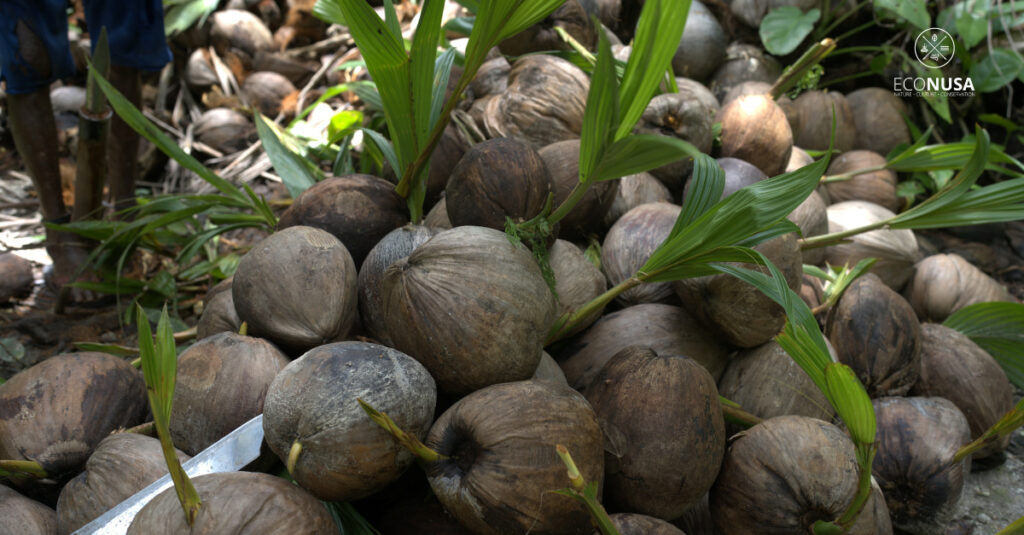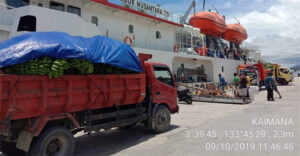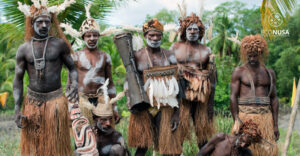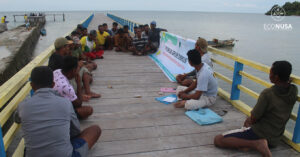
Nabire Regency, located on the northern coast of Central Papua, is not only blessed with stunning natural beauty and abundant marine resources but also holds strong agribusiness potential, one of the key commodities being coconuts. In Nabire, coconuts are more than just plantation crops; they are a high-value commodity that supports the livelihoods of coastal and island communities.
Coconuts grow abundantly in various regions, especially in districts like Makimi, Moora, Yaur, and on islands such as Mambor, Nariki, and Hariti. Predominantly consisting of tall coconut varieties, these trees have been cultivated for generations and are managed using traditional methods by local communities. Uniquely, Nabire coconuts are known for their thick, high-quality flesh, making them ideal for producing copra, coconut oil, and other coconut-derived products.
For the coastal communities of Nabire, coconuts are a primary source of income, sustaining household economies. Beyond being sold as fresh fruit or coconut water, coconuts are processed into copra, which serves as raw material for the oil industry, as well as into virgin coconut oil (VCO). The coconut shells are converted into briquettes, while the husks are used for crafts or planting media. Every part of the coconut is utilized, making it a multifunctional and sustainable commodity.
Also Read: Kaimana Copra Distributed to National Markets
To enhance the value of coconuts, both the government and local communities have begun organizing and professionalizing copra production. In 2024, the production target reached 20 tons of copra per month, involving more than 300 farmers across 16 production sites. The main processing center is located in Worbak Village, Makimi District, managed by the Sisandei Maju Bersama Cooperative. Nabire’s copra not only meets local demand but is also shipped to major cities like Palu and Surabaya, creating export opportunities and expanding distribution networks. Since November 2024, EcoNusa has partnered with the cooperative to purchase community-produced copra, with 12 tons already shipped to Surabaya.
In addition to collaborating with factories for copra shipping, briquette sales, and coconut fiber processing, the Sisandei Maju Bersama Cooperative has also initiated talks with a factory in Yogyakarta for the production and packaging of soy sauce made from coconut water. “We’re exploring cooperation with a factory in Jogja to produce soy sauce from coconut water. The packaging will also be done there,” explained Moses Manuaron, manager of the cooperative, when interviewed in Worbak Village.
Also Read: Albumin Pills: Non-Timber Forest Product from Boven Digoel
One of the strengths of the coconut management system in Nabire is its environmentally friendly approach. During the copra processing phase, coconut shell waste is turned into briquettes—an eco-friendly alternative fuel source. The coconut husk is also put to use. This aligns with green economy principles, where every part of the coconut is fully utilized. Not only does this positively impact the environment, but it also creates new business opportunities and jobs, particularly for youth and women in coastal villages.
The successful development of coconuts as a flagship commodity is the result of collaboration among various parties, including the Nabire Regency Government through funding from the Regional Development and Expenditure Budget (APBD), civil society organizations as development partners, and technical agencies such as the Regional Development Planning Agency, the Agriculture Office, the Plantation Office, and the Industry Office. This collaboration not only provides infrastructure and technological support but also gives farmers access to training, financing, and markets.
Coconuts have proven to be a high-value commodity that not only delivers direct economic benefits to farmers but also drives local economic transformation toward a more sustainable, inclusive, and modern future.




